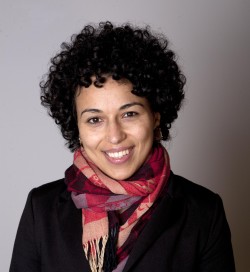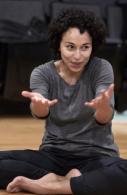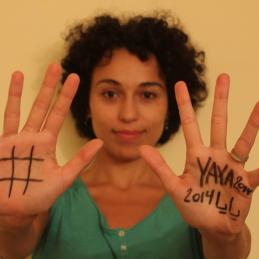Chers Messieurs Lissner et Millepied, de la direction de l’Opéra de Paris, savez-vous que la danse et la chorégraphie existent en Palestine ? La danse classique, contemporaine, hip hop, folklorique…. Oui mais voilà, l’exercer sous occupation, est un véritable défi. Farah Saleh en parle en connaissance de cause.
 Farah Saleh, chorégraphe et danseuse palestinienne, a fait le choix, bien qu’ayant obtenu la nationalité italienne, de s’installer à Ramallah en 2010, et d’y travailler avec le groupe de danse contemporaine Sareyyet Ramallah Dance Company.
Farah Saleh, chorégraphe et danseuse palestinienne, a fait le choix, bien qu’ayant obtenu la nationalité italienne, de s’installer à Ramallah en 2010, et d’y travailler avec le groupe de danse contemporaine Sareyyet Ramallah Dance Company.
Elle coordonne de nombreux projets artistiques, avec des organisations culturelles palestiniennes telles que l’Ecole de Cirque Palestinienne et le festival de danse contemporaine de Ramallah.
Elle a développé des spectacles interactifs avec le public, utilisant à la fois la vidéo, le graffiti et d’autres arts visuels en complément de la gestuelle. Elle est reconnue dans le monde entier pour ses chorégraphies inventives, y compris aux Etats-Unis où on lui demande de venir faire des formations*.

–Et voici ce qu’elle dit :
« Je suis née dans le camp de réfugiés palestiniens de Yarmouk en Syrie. J’ai commencé la danse classique à l’âge de 7 ans à Amman, en Jordanie.
Il faut savoir qu’en Palestine, il est impossible d’avoir une formation à la danse digne de ce nom, à cause de l’occupation et de l’inexistence d’un Etat palestinien avec des académies nationales, du fait de cette occupation.
Quand nous organisons des festivals de danse internationaux, bon nombre de compagnies de danse ne réussissent même pas à entrer en Palestine, notamment celles d’origine arabe.
Quand notre groupe « Sareyyet Ramallah » veut présenter ses spectacles en Israël où il y a 20% de la population qui est palestinienne, les autorités israéliennes refusent l’autorisation d’entrer à certains des danseurs de la compagnie, nous obligeant à annuler les spectacles.
Quand nous voulons travailler avec nos collègues palestiniens vivant en Israël, c’est eux qui doivent réussir à frauder à l’aller comme au retour pour pouvoir nous rejoindre en Cisjordanie occupée, car cela est interdit à tous ceux qui ont des passeports israéliens.
Quand nous voulons voyager et nous produire à l’étranger, se pose systématiquement le problème des visas de sortie et la traversée humiliante du pont Allenby avec tous ses checkpoints.
Quand nous voulons travailler avec d’autres artistes palestiniens de Cisjordanie, c’est toujours très compliqué : les checkpoijtns partout rallongent les distances et te temps des parcours. Normalement, on devrait mettre 20 minutes pour se rendre à Béthléem, mais cela peut prendre 4 à 5 fois plus quand on y parvient.
Nos collègues du camp de réfugiés d’Askar à Naplouse par exemple subissent des raids israéliens pratiquement toutes les nuits, y compris à l’intérieur de leur centre culturel.
Alors merci pour votre action ! »
Farah Saleh
fsaleh@hotmail.com
– VOIR FARAH ET SA COMPAGNIE DANSER :
« Ordinary madness » (Folie ordinaire)) :
« Face à la folie mondiale avec sa globalisation, ses guerres coloniales, ses modèles de consommation, et le réchauffement climatique, la « folie ordinaire » se reflète dans la société palestinienne », explique Farah à propos de cette chorégraphie qu’elle a réalisée, en collaboration avec les danseurs : Adel Mashriky, Majd Hajjaj, Salma Ataya, et Yazan Eweidat.
-[rouge] ICI[/rouge] un aperçu des ses spectacles interactifs lors du dernier festival de danse contemporaine à Ramallah, où elle préconise « une troisième intifada artistique » et exprime la volonté de liberté au travers de la danse en créant un lien actif avec le public :
*Farah Saleh a également réalisé de nombreuses autres chorégraphies : “Sandwishet Labaneh” en 2011, “Parole, parole, parole” in 2012. Elle participe depuis 2009 à la Performing Arts Summer School (PASS), organisée par la Fondation Al Qattan, the Royal Flemish Theatre and Les Ballets C de la B. Elle a également participé à nombre de co-production de danse et de théâtre comme Keffiyeh/made in China/ 2012, et Badkeh/2013.
– le mois dernier elle donnait des cours de danse créative aux USA
: http://www.brown.edu/research/pembroke-center/news/2015-11/photos-gendered-gestures-between-self-representation-and-social-projection
– [rouge]MESSIEURS LISSNER ET MILLEPIED, CES ARTISTES VOUS LE DEMANDENT : NE DANSEZ PAS AVEC L’APARTHEID ![/rouge]
– slissner@operadeparis.fr
– info@benjaminmillepied.com
– service.spectateurs@info.operadeparis.fr

CAPJPO-EuroPalestine
****************************
– [violet]Farah Saleh is a Palestinian dancer and choreographer. She has studied linguistic and cultural mediation in Italy and in parallel continued her studies in contemporary dance. She has been dancing and choreographing with Sareyyet Ramallah Dance Company since 2010.[/violet]
– [violet]ENGLISH TEXT SENT BY FARAH SALEH[/violet]
[violet] »I was born in Yarmouk refugee camp in Damascus. I started dancing ballet in Amman at the age 7.
Our group is called Sareyyet Ramallah and it is based in Ramallah.
We can’t have proper education in dance because of the occupation and the inexistance of a Palestinian State and national academies.
When we organize international dance festivals, some companies can’t enter Palestine, especially those from Arab origins.
When we want to present our performances in 48 territories, the Israelis don’t give permits to all dancers, just to cancel the show.
When we would like to work with Palestinian dancers from 48 they have to enter and exit saying that they entered by mistake, because with their Israeli passports they are officially not allowed to come to the West Bank.
When we want to tour in the world with our pieces it’s always the problem of the visas (labled as Palestinian terrorists) and the long and humiliating crossing of the bridge.
It’s complicated to collaborate with Artists from other West Bank cities, for instance from Bethlehem, because it takes more than 1 hour to get there, while it is supposed to be 20 min. Our fellow dancers from Askar Camp in Nablus have Israeli rides into the camp almost every night, including their cultural center.
Thanks for your message and your activism « ![/violet]
– SEE FARAH SALEH AND HER GROUP DANCE : « Ordinary Madness »
She explains : « The relation between humans and nature has been changing enormously during the past two decades. New modern models of administration of the relationship between human beings, and between them and nature have arisen: like massive industrialization, colonial conquests and consumption models, which resulted in new wars, commodification of the world and global warming. What we can call « world madness ». Ordinary Madness portrays these changes in the Palestinian context, giving an overview of the Palestinian life under modernity rule and asking the audience to reflect on it. »
– She also creates interactive performances such as the ones here :
ttps://www.youtube.com/watch?v=YK1D8xRhrdk
– She took part in and toured internationally with Keffiyeh/made in China (2012) and Badke
(2013) co-produced by the Royal Flemish Theatre (KVS), A.M Qattan Foundation and Les Ballets C de la B. She has also been teaching dance, coordinating and curating artistic projects since 2010 with the Palestinian Circus School, Sareyyet Ramallah and the Ramallah
Contemporary Dance Festival. In 2014 she won the third prize of the Young Artist of the Year Award (YAYA) for her installation A Fidayee Son in Moscow.
– Last month she presented a workshop at the Pembroke Center (USA) : Department of Theatre Arts and Performance Studies and Middle East Studies. Creative dance instructor/choreographer, Ramallah, Palestine :
http://www.brown.edu/research/pembroke-center/news/2015-11/photos-gendered-gestures-between-self-representation-and-social-projection
« This workshop sought to identify what is experienced and perceived as gendered gestures and to understand how the specific ways people move on and off stage are socially constructed. Participants did exercises that explored their relationships to their own bodies and to the bodies of others to investigate how they can consciously start choosing among these gendered gestures and to include them or exclude them from their full range of movements. »
– [rouge]PLEASE STEPHANE LISSNER AND BENJAMIN MILLEPIED FROM THE PARIS OPERA : DON’T DANCE WITH APARTHEID ![/rouge]
– slissner@operadeparis.fr
– info@benjaminmillepied.com
– service.spectateurs@info.operadeparis.fr

CAPJPO-EuroPalestine


